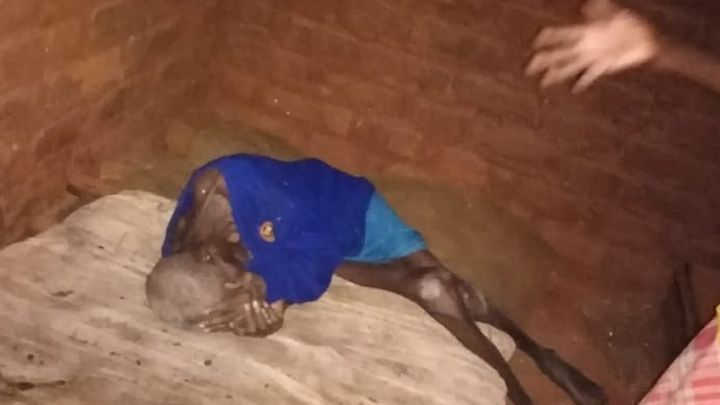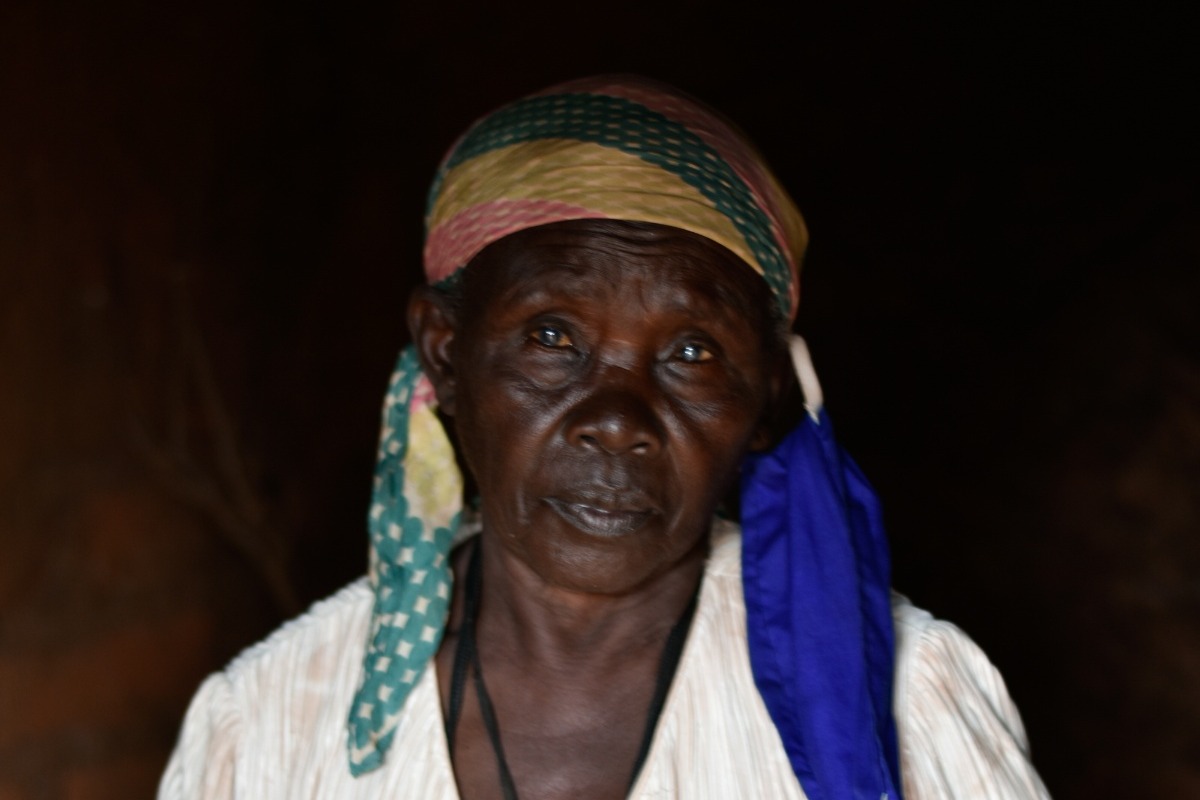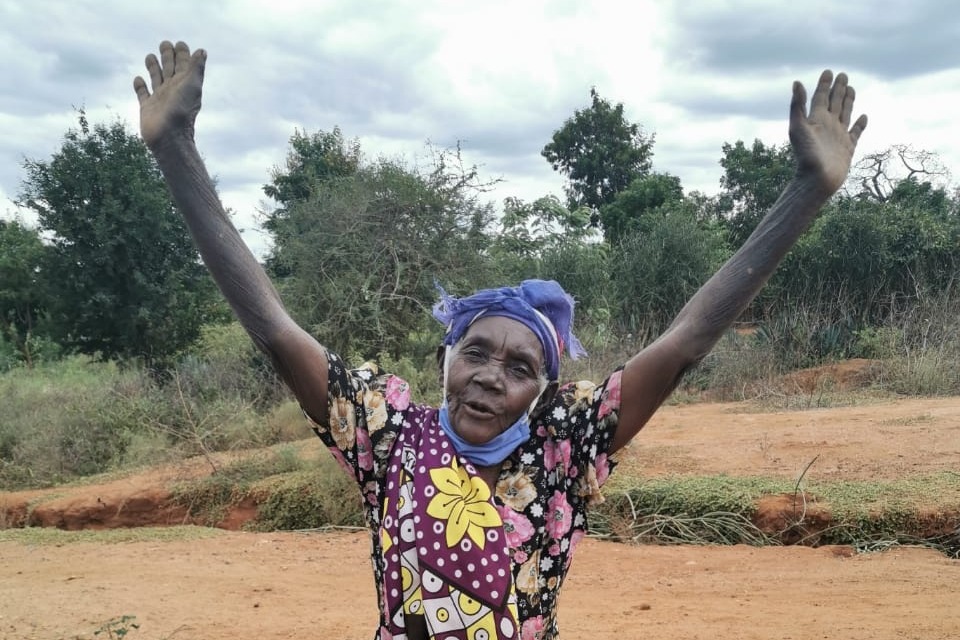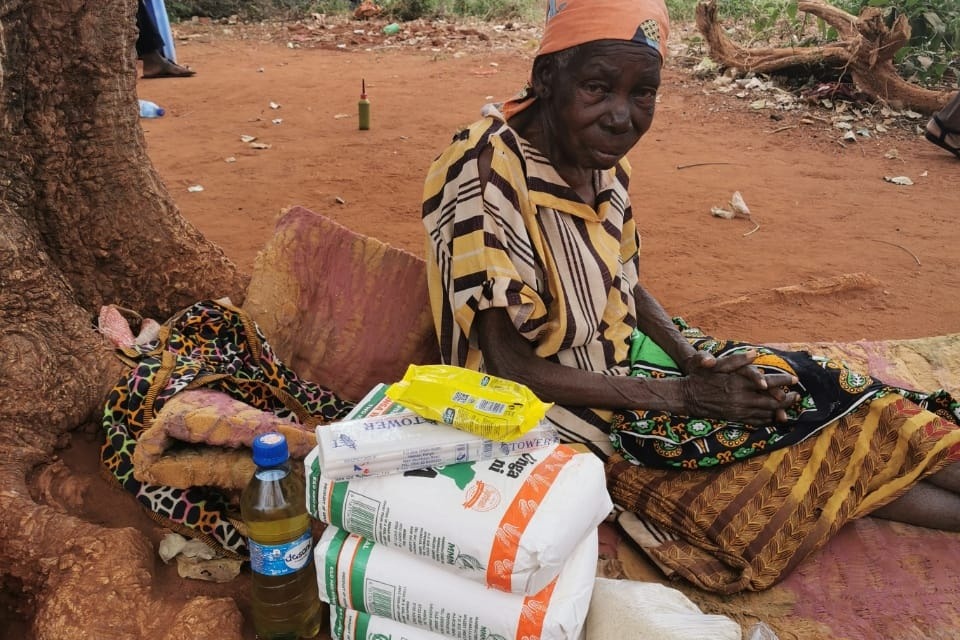
HilfDoch! - Help us feed people in Kisayani, Kenya
Donation protected
(English Version please see below)
Über uns
Mein Name ist Caroline Mwandiku Koehler. Ich lebe mit meinen drei Kindern in einem kleinen Dorf namens Kisayani in Kenia. Bevor wir in 2011 hier her gezogen sind haben wir in Deutschland gewohnt, wo ich zusammen mit meinem Mann den Verein ‚Hilfe für Kenia e.V. gegründet habe. Der Verein ist nun in Kempten registriert.
Über ‘Hilfe für Kenia e.V. ‘
‚Hilfe für Kenia e.V.‘ hat das erste Projekt in 2009 abgewickelt. Zu dieser Zeit war das größte Problem dass wir zwar, neben ein paar großen Spenden, viele kleine Spenden erhalten haben aber die jeweiligen Spender von uns erwartet haben, dass wir für jede dieser Spenden einen detaillierten Bericht abgeben. Deshalb beschlossen wir das wir in dieser Zeit lieber arbeiten gehen und das somit zusätzlich erwirtschaftete Geld für die Hilfe Bedürftiger in Kisayani und Kibwezi einsetzen. Wir haben das für die letzten neun Jahre durchgezogen.
Unsere Projekte im Einzelnen beinhalteten:
• Das Bezahlen von Schulgeldern, Uniformen und Büchern für 60 Waisen und andere hilfsbedürftige Kinder
• Die Organisation der Ausbildung für etwa 100 jungen Männern und Frauen in den Berufen Maurer, Zimmermann, Schweißer usw.
• Die Essensverteilung in Partnerschaft mit der ‚Midwest Food Bank (US)‘. Im Rahmen dieses Projekts haben wir ca. 30t Essen an mehr als 700 Bedürftige verteilt.
• Die Organisation von Sportsveranstaltungen die es der jüngeren Generation erlauben ihre Fähigkeiten und ihre Talente unter Beweis zu stellen. Diese Projekte sollten hauptsächlich dazu beitragen den sonst arbeitslosen Jugendlichen ein Ziel zu geben und sie somit von der Straße fern zu halten. Es ging dabei um Radrennen und Fußballspiele mit Trophäen und Preisen wie Motorrädern und Fahrrädern die es den Erstplatzierten wiederum erlaubten ein Einkommen zu generieren.
• Die Spende von Kleidung und Hygieneprodukten um die Gesundheit und das Wohlbefinden der Gemeindemitglieder zu fördern.
Kisayani und der Bereich Kikumbulyu North haben ca. 41.000 Einwohner wovon die meisten an oder unter der Armutsgrenze leben. Das Durchschnittsalter ist sehr niedrig und es ist keine Seltenheit das Kinder im Alter von 9 Jahren entweder für sich selbst oder gar für ihre ganze Familie sorgen müssen. Das ist häufig der Fall wenn die Eltern selbst, sei es wegen Krankheit oder Behinderungen, nicht mehr arbeiten können. Glücklicherweise sind uns zum Zeitpunkt des Starts dieser Kampagne keine Todesfälle bekannt was aber nicht unbedingt etwas heißen muss, da die Bevölkerung über einen sehr großen Bereich verteilt ist. Der Hunger unter den Kindern und den Älteren ist jedoch allgegenwärtig.
Als ob das nicht genug wäre, haben die COVID-19 Beschränkungen die Situation noch zusätzlich verschärft. Viele Orte wurden komplett abgeriegelt um die Ausbreitung des Virus zu verhindern. Gemüse- und Viehmärkte, die Haupteinnahmequelle der Landbevölkerung, wurden verboten. Das bedeutet mehrere tausend zusätzliche Familien die ohne Einkommen dastehen. Momentan können sich viele nicht einmal die 20 Cent für einen 20 Liter Kanister Wasser leisten. Außerdem wurden die Schulen geschlossen, was bedeutet das die Kinder auch keinen Zugang zu einer regelmäßigen Mahlzeit in der Schule haben. Diese muss nun auch von deren Eltern gesichert werden. Das Geld ist selbst zu knapp für den Kauf von Schutzmasken was ein Verlassen der häuslichen Umgebung unmöglich macht und somit zusätzlich dafür sorgt, dass kein Einkommen generiert werden kann. Zusätzlich ist es, im Zusammenhang mit dieser Krise, unserem Partner ‚Midwest Foodbank‘ auch nicht mehr möglich uns mit Grundnahrungsmitteln auszuhelfen was dazu geführt hat, dass wir unsere Aktivitäten vorläufig einstellen mussten.
Unser Familie hat sich glücklicherweise frühzeitig dafür entschieden Hühner zu züchten und Gemüse anzubauen was es uns ermöglich uns um uns selbst zu kümmern. Mein Mann, der normalerweise als selbständiger Ingenieur von Projekt zu Projekt um die Welt reist hat im Zusammenhang mit COVID-19 ebenfalls seine Arbeit verloren und kann, wegen der Reisebeschränkungen, auch nicht zurück nach Kenia kommen. Deshalb ist es uns leider nicht mehr möglich unsere Gemeinde mit unseren eigenen Mitteln zu unterstützen. Um Essen für eine vierköpfige Familie zu kaufen benötigt es etwa $2.83 pro Tag oder $85 pro Monat. Leider ist es so dass unsere Gemeinde nicht von den vielfältigen, überregionalen Hilfsprogrammen profitiert. Deshalb wenden wir uns mit dieser Kampagne an Sie. Bitte helfen Sie uns zu Helfen. Jeder Euro zählt. Herzlichen Dank.
About Us
My name is Caroline Mwandiku Koehler, my three children and I currently live in a small, remote village in Kenya, called Kisayani. Before moving here, in 2011, we lived in Germany, where my husband and I founded a non-profit called ‘Hilfe für Kenia e.V’. ‘Hilfe für Kenia’ is now registered in Kempten.
About ‘Hilfe für Kenia e.V. ‘
‘Hilfe für Kenya’ began operating in 2009. Still, it was soon met with hard times as getting the donations was filled with complications. Donators would give relatively low amounts of donations but expect full-fledged reports on what has been done with funds. Therefore, my husband and I decided that it would be more cost-effective to use our income and savings to help the people of Kisayani, and the Kibwezi community at large. We have been keeping this personally funded sponsorship up for the past nine years.
The undertakings we have pursued include:
· Providing school fees for about 60 orphaned and differently needy children, which would also include paying for school uniforms, course books and stationery.
· Sponsored vocational training for roughly 100 young men and women, to learn crafts such as masonry, carpentry, welding, and others of the likes, who otherwise would not have been able to afford college fees.
· Food programs of which the most recent involved donating 30 tonnes of fortified rice. It mostly went to older people whose children have perished from ailments such as HIV/Aids or Tuberculosis, and who have no other source of support. This food, which we were able to obtain (in 2018 and 2019) from the Midwest Food Bank (U.S.), in its entirety went to the support of roughly 700 needy people within my community.
· We have also organised many sports events for young people to display their athletic skills and talents. We did this not only to help these young people discover and nurture their skills but also to try and keep them off the streets and from engaging in harmful activities. These events included bicycle races and football tournaments with trophies, and prizes for the winners.
· Donations of bare essentials such as clothes and sanitary products to further the general hygiene of the homes within this community.
Kisayani and the ward which it is in (Kikumbulyu North) has a population totalling around 41,000 people, majority of whom live on or below the poverty line. There is a substantial population of young children, as young as nine-year-olds that are forced, by the circumstances, to fend for themselves or their families. Much of this circumstantial child labour happens when parents aren’t able to work themselves, either due to sickness or disability. Luckily, no reports of deaths due to starvation have been made. Still, the remoteness of the area does not allow us to say that there haven’t been any confidently. It is effortless to see, however, the existing hunger through the eyes of the helpless young children and the old abandoned senior citizens.
As though that wasn’t bad enough already, the Government regulations brought about by the COVID-19 pandemic have made it even more difficult for the needy people to provide for themselves. Various counties have locked themselves up in an attempt to isolate the virus and stop it’s spread. This, coupled with the fact that vegetable and livestock markets are forced to close, means that thousands of families are left without any income. It has reached a point at which many families cannot even afford water; of which 20 litres cost around 20KSh ($0.2). Moreover, due to the pandemic, children are no longer going to school. They can, therefore, not rely on the meal provided there at lunch. This has made it extremely difficult for parents with many children as they now not only can’t trade but also have to provide one more meal than usual. Facemasks have also been made mandatory, but there is no regulation provided to curb the price hiking. Therefore, families who can’t afford them are forced to stay at home, further reducing the chance for them to make an income. Because of this global crisis, donations from the Midwest Foodbank have stopped being released to the people that need.
My family and I are fortunate enough to grow chicken and vegetables, at home, that lets us sustain ourselves. Still, with my husband now stuck in the U.K., without income (he would usually work around the world on contract basis as an engineer) we are no longer able to afford to help the people around us. To feed a family of four, it would take only about $2.83 per day or $85 per month. With all the calls for help, people of this region get left unassisted, but you can make a difference. Every donation counts.
Help us help the people.













Über uns
Mein Name ist Caroline Mwandiku Koehler. Ich lebe mit meinen drei Kindern in einem kleinen Dorf namens Kisayani in Kenia. Bevor wir in 2011 hier her gezogen sind haben wir in Deutschland gewohnt, wo ich zusammen mit meinem Mann den Verein ‚Hilfe für Kenia e.V. gegründet habe. Der Verein ist nun in Kempten registriert.
Über ‘Hilfe für Kenia e.V. ‘
‚Hilfe für Kenia e.V.‘ hat das erste Projekt in 2009 abgewickelt. Zu dieser Zeit war das größte Problem dass wir zwar, neben ein paar großen Spenden, viele kleine Spenden erhalten haben aber die jeweiligen Spender von uns erwartet haben, dass wir für jede dieser Spenden einen detaillierten Bericht abgeben. Deshalb beschlossen wir das wir in dieser Zeit lieber arbeiten gehen und das somit zusätzlich erwirtschaftete Geld für die Hilfe Bedürftiger in Kisayani und Kibwezi einsetzen. Wir haben das für die letzten neun Jahre durchgezogen.
Unsere Projekte im Einzelnen beinhalteten:
• Das Bezahlen von Schulgeldern, Uniformen und Büchern für 60 Waisen und andere hilfsbedürftige Kinder
• Die Organisation der Ausbildung für etwa 100 jungen Männern und Frauen in den Berufen Maurer, Zimmermann, Schweißer usw.
• Die Essensverteilung in Partnerschaft mit der ‚Midwest Food Bank (US)‘. Im Rahmen dieses Projekts haben wir ca. 30t Essen an mehr als 700 Bedürftige verteilt.
• Die Organisation von Sportsveranstaltungen die es der jüngeren Generation erlauben ihre Fähigkeiten und ihre Talente unter Beweis zu stellen. Diese Projekte sollten hauptsächlich dazu beitragen den sonst arbeitslosen Jugendlichen ein Ziel zu geben und sie somit von der Straße fern zu halten. Es ging dabei um Radrennen und Fußballspiele mit Trophäen und Preisen wie Motorrädern und Fahrrädern die es den Erstplatzierten wiederum erlaubten ein Einkommen zu generieren.
• Die Spende von Kleidung und Hygieneprodukten um die Gesundheit und das Wohlbefinden der Gemeindemitglieder zu fördern.
Kisayani und der Bereich Kikumbulyu North haben ca. 41.000 Einwohner wovon die meisten an oder unter der Armutsgrenze leben. Das Durchschnittsalter ist sehr niedrig und es ist keine Seltenheit das Kinder im Alter von 9 Jahren entweder für sich selbst oder gar für ihre ganze Familie sorgen müssen. Das ist häufig der Fall wenn die Eltern selbst, sei es wegen Krankheit oder Behinderungen, nicht mehr arbeiten können. Glücklicherweise sind uns zum Zeitpunkt des Starts dieser Kampagne keine Todesfälle bekannt was aber nicht unbedingt etwas heißen muss, da die Bevölkerung über einen sehr großen Bereich verteilt ist. Der Hunger unter den Kindern und den Älteren ist jedoch allgegenwärtig.
Als ob das nicht genug wäre, haben die COVID-19 Beschränkungen die Situation noch zusätzlich verschärft. Viele Orte wurden komplett abgeriegelt um die Ausbreitung des Virus zu verhindern. Gemüse- und Viehmärkte, die Haupteinnahmequelle der Landbevölkerung, wurden verboten. Das bedeutet mehrere tausend zusätzliche Familien die ohne Einkommen dastehen. Momentan können sich viele nicht einmal die 20 Cent für einen 20 Liter Kanister Wasser leisten. Außerdem wurden die Schulen geschlossen, was bedeutet das die Kinder auch keinen Zugang zu einer regelmäßigen Mahlzeit in der Schule haben. Diese muss nun auch von deren Eltern gesichert werden. Das Geld ist selbst zu knapp für den Kauf von Schutzmasken was ein Verlassen der häuslichen Umgebung unmöglich macht und somit zusätzlich dafür sorgt, dass kein Einkommen generiert werden kann. Zusätzlich ist es, im Zusammenhang mit dieser Krise, unserem Partner ‚Midwest Foodbank‘ auch nicht mehr möglich uns mit Grundnahrungsmitteln auszuhelfen was dazu geführt hat, dass wir unsere Aktivitäten vorläufig einstellen mussten.
Unser Familie hat sich glücklicherweise frühzeitig dafür entschieden Hühner zu züchten und Gemüse anzubauen was es uns ermöglich uns um uns selbst zu kümmern. Mein Mann, der normalerweise als selbständiger Ingenieur von Projekt zu Projekt um die Welt reist hat im Zusammenhang mit COVID-19 ebenfalls seine Arbeit verloren und kann, wegen der Reisebeschränkungen, auch nicht zurück nach Kenia kommen. Deshalb ist es uns leider nicht mehr möglich unsere Gemeinde mit unseren eigenen Mitteln zu unterstützen. Um Essen für eine vierköpfige Familie zu kaufen benötigt es etwa $2.83 pro Tag oder $85 pro Monat. Leider ist es so dass unsere Gemeinde nicht von den vielfältigen, überregionalen Hilfsprogrammen profitiert. Deshalb wenden wir uns mit dieser Kampagne an Sie. Bitte helfen Sie uns zu Helfen. Jeder Euro zählt. Herzlichen Dank.
About Us
My name is Caroline Mwandiku Koehler, my three children and I currently live in a small, remote village in Kenya, called Kisayani. Before moving here, in 2011, we lived in Germany, where my husband and I founded a non-profit called ‘Hilfe für Kenia e.V’. ‘Hilfe für Kenia’ is now registered in Kempten.
About ‘Hilfe für Kenia e.V. ‘
‘Hilfe für Kenya’ began operating in 2009. Still, it was soon met with hard times as getting the donations was filled with complications. Donators would give relatively low amounts of donations but expect full-fledged reports on what has been done with funds. Therefore, my husband and I decided that it would be more cost-effective to use our income and savings to help the people of Kisayani, and the Kibwezi community at large. We have been keeping this personally funded sponsorship up for the past nine years.
The undertakings we have pursued include:
· Providing school fees for about 60 orphaned and differently needy children, which would also include paying for school uniforms, course books and stationery.
· Sponsored vocational training for roughly 100 young men and women, to learn crafts such as masonry, carpentry, welding, and others of the likes, who otherwise would not have been able to afford college fees.
· Food programs of which the most recent involved donating 30 tonnes of fortified rice. It mostly went to older people whose children have perished from ailments such as HIV/Aids or Tuberculosis, and who have no other source of support. This food, which we were able to obtain (in 2018 and 2019) from the Midwest Food Bank (U.S.), in its entirety went to the support of roughly 700 needy people within my community.
· We have also organised many sports events for young people to display their athletic skills and talents. We did this not only to help these young people discover and nurture their skills but also to try and keep them off the streets and from engaging in harmful activities. These events included bicycle races and football tournaments with trophies, and prizes for the winners.
· Donations of bare essentials such as clothes and sanitary products to further the general hygiene of the homes within this community.
Kisayani and the ward which it is in (Kikumbulyu North) has a population totalling around 41,000 people, majority of whom live on or below the poverty line. There is a substantial population of young children, as young as nine-year-olds that are forced, by the circumstances, to fend for themselves or their families. Much of this circumstantial child labour happens when parents aren’t able to work themselves, either due to sickness or disability. Luckily, no reports of deaths due to starvation have been made. Still, the remoteness of the area does not allow us to say that there haven’t been any confidently. It is effortless to see, however, the existing hunger through the eyes of the helpless young children and the old abandoned senior citizens.
As though that wasn’t bad enough already, the Government regulations brought about by the COVID-19 pandemic have made it even more difficult for the needy people to provide for themselves. Various counties have locked themselves up in an attempt to isolate the virus and stop it’s spread. This, coupled with the fact that vegetable and livestock markets are forced to close, means that thousands of families are left without any income. It has reached a point at which many families cannot even afford water; of which 20 litres cost around 20KSh ($0.2). Moreover, due to the pandemic, children are no longer going to school. They can, therefore, not rely on the meal provided there at lunch. This has made it extremely difficult for parents with many children as they now not only can’t trade but also have to provide one more meal than usual. Facemasks have also been made mandatory, but there is no regulation provided to curb the price hiking. Therefore, families who can’t afford them are forced to stay at home, further reducing the chance for them to make an income. Because of this global crisis, donations from the Midwest Foodbank have stopped being released to the people that need.
My family and I are fortunate enough to grow chicken and vegetables, at home, that lets us sustain ourselves. Still, with my husband now stuck in the U.K., without income (he would usually work around the world on contract basis as an engineer) we are no longer able to afford to help the people around us. To feed a family of four, it would take only about $2.83 per day or $85 per month. With all the calls for help, people of this region get left unassisted, but you can make a difference. Every donation counts.
Help us help the people.













Organizer and beneficiary
Tonny Bach
Organizer
Hilfe für Kenia e.V.
Beneficiary